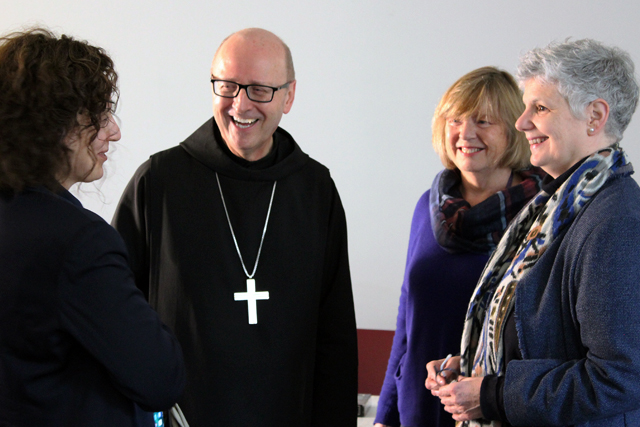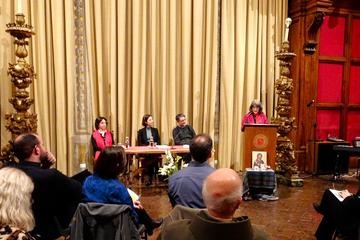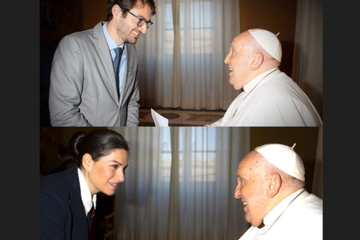
By Elena Dini
ROME — The first pages of a book are very important: they help us to gain insight and acquire key elements to understanding the plot. The Beatitudes — Jesus’ first discourse in the Gospel of Matthew — do the same, said Abbot Primate Gregory Polan, OSB, at The Lay Centre March 23.
Abbot Primate Polan, the official head of the Benedictine Order worldwide, led The Lay Centre's ecumenical Lenten retreat on the theme, “Living the Beatitudes Today.” The morning focused on four of the eight Beatitudes.
“Blessed are the poor in spirit, for theirs is the kingdom of heaven” (Mt 5:3). For this first Beatitude, Abbot Polan invited retreatants to consider how the idea of associating a kingdom to the poor in spirit is groundbreaking.
“Indeed, the prophets proclaimed God’s special care for the poor and needy; but never a kingdom for the poor. Happy are they ‘who have;’ and our society seems to think, happiest are they that have most. No one had ever linked poverty with the blessing before,” said Abbot Polan.
The oft-asked question that is important to answer is, “Who are the poor in spirit?” “The ‘poor in spirit’ are those who realize and readily confess that they are sinful, ignorant and weak,” said Abbot Polan. In recognizing our inner poverty, we long to change and get closer to Jesus, he added.
Abbot Polan translated the second Beatitude he discussed — “Blessed are pure of heart, for they shall see God” — into more familiar and everyday language for retreatants.
“Blessed are pure of heart, for they see the spiritual treasures of life in all the unexpected places: gaining insight to the monotonies of each day, the glory that lies below the dust, the eternal in every hour — and seeing these things is seeing God,” he said.
The third Beatitude he reflected upon was: “Blessed are they who hunger and thirst for righteousness, for they will be satisfied.”
Righteousness is a word that needs to be further explored, he said. He proposed to understand “righteousness” as “right relationship.”
“Because God always deals with each of us justly, he establishes ‘right relationship’ with each of us, and therefore, we need to create and sustain ‘right relationships’ with others,” he said.
The last Beatitude Abbot Polan unpacked for retreatants was, “Blessed are the merciful, for they will be shown mercy.”
He offered food for thought about the relationship between justice and mercy, as well as the interesting same nature reward — they will be shown mercy — for those who have a merciful spirit, a spirit “that learns to magnify God’s love that continues to forgive us, time and time again,” he concluded.
The retreat was inspired by Benedictine spirituality, tradition, and practice, including Lectio Divina or the prayerful reading of Scripture.
“The practice of Lectio Divina has its origins in the monastic tradition,” he explained. “One of the things that is really helpful is for people to make the Scriptures their own, to read a passage and reflect on what is God saying to (them) and then pray on that text.”
Abbot Polan spoke with the retreatants and members of the resident community, who largely participated at this moment of reflection and prayer — a wonderfully diverse group of people.
The morning ecumenical retreat ended with a moment of prayer, led by Rev. Dr. Tim Macquiban, Minister of the Ponte Sant'Angelo Methodist Church in Rome, and adapted from the Daily Prayer by the Archbishops' Council of the Church of England.


